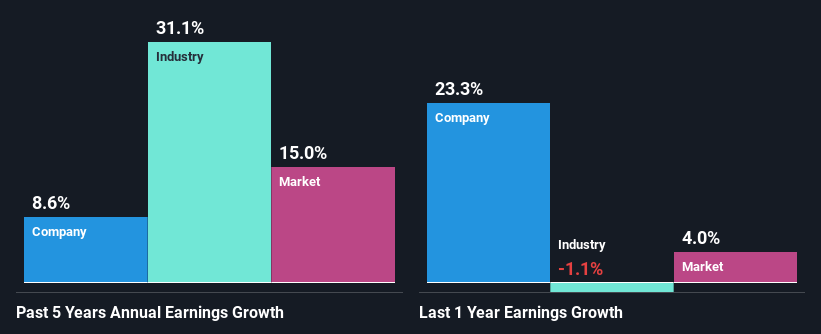Are NVE Corporation's (NASDAQ:NVEC) Fundamentals Good Enough to Warrant Buying Given The Stock's Recent Weakness?
NVE (NASDAQ:NVEC) has had a rough month with its share price down 18%. However, the company's fundamentals look pretty decent, and long-term financials are usually aligned with future market price movements. Specifically, we decided to study NVE's ROE in this article.
Return on Equity or ROE is a test of how effectively a company is growing its value and managing investors’ money. In other words, it is a profitability ratio which measures the rate of return on the capital provided by the company's shareholders.
Check out our latest analysis for NVE
How To Calculate Return On Equity?
Return on equity can be calculated by using the formula:
Return on Equity = Net Profit (from continuing operations) ÷ Shareholders' Equity
So, based on the above formula, the ROE for NVE is:
32% = US$22m ÷ US$66m (Based on the trailing twelve months to September 2023).
The 'return' refers to a company's earnings over the last year. So, this means that for every $1 of its shareholder's investments, the company generates a profit of $0.32.
What Has ROE Got To Do With Earnings Growth?
Thus far, we have learned that ROE measures how efficiently a company is generating its profits. Depending on how much of these profits the company reinvests or "retains", and how effectively it does so, we are then able to assess a company’s earnings growth potential. Generally speaking, other things being equal, firms with a high return on equity and profit retention, have a higher growth rate than firms that don’t share these attributes.
NVE's Earnings Growth And 32% ROE
Firstly, we acknowledge that NVE has a significantly high ROE. Secondly, even when compared to the industry average of 15% the company's ROE is quite impressive. This probably laid the groundwork for NVE's moderate 8.6% net income growth seen over the past five years.
We then compared NVE's net income growth with the industry and found that the company's growth figure is lower than the average industry growth rate of 31% in the same 5-year period, which is a bit concerning.
Earnings growth is a huge factor in stock valuation. What investors need to determine next is if the expected earnings growth, or the lack of it, is already built into the share price. By doing so, they will have an idea if the stock is headed into clear blue waters or if swampy waters await. One good indicator of expected earnings growth is the P/E ratio which determines the price the market is willing to pay for a stock based on its earnings prospects. So, you may want to check if NVE is trading on a high P/E or a low P/E, relative to its industry.
Is NVE Efficiently Re-investing Its Profits?
NVE has a very high three-year median payout ratio of 133% suggesting that the company's shareholders are getting paid from more than just the company's earnings. Still the company's earnings have grown respectably. That being said, the high payout ratio could be worth keeping an eye on in case the company is unable to keep up its current growth momentum.
Besides, NVE has been paying dividends over a period of eight years. This shows that the company is committed to sharing profits with its shareholders.
Summary
On the whole, we do feel that NVE has some positive attributes. Its earnings have grown respectably as we saw earlier, probably due to its high returns. However, it does reinvest little to almost none of its profits, so we wonder what effect this could have on its future growth prospects. So far, we've only made a quick discussion around the company's earnings growth. To gain further insights into NVE's past profit growth, check out this visualization of past earnings, revenue and cash flows.
Have feedback on this article? Concerned about the content? Get in touch with us directly. Alternatively, email editorial-team (at) simplywallst.com.
This article by Simply Wall St is general in nature. We provide commentary based on historical data and analyst forecasts only using an unbiased methodology and our articles are not intended to be financial advice. It does not constitute a recommendation to buy or sell any stock, and does not take account of your objectives, or your financial situation. We aim to bring you long-term focused analysis driven by fundamental data. Note that our analysis may not factor in the latest price-sensitive company announcements or qualitative material. Simply Wall St has no position in any stocks mentioned.

